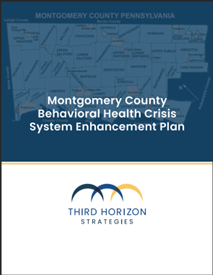According to Mental Health America’s 2023 State of Mental Health report, 21 percent of adults are experiencing a mental illness yet 55 percent of those (equating to more than 28 million Americans) do not receive treatment. Recent data from the Centers for Disease Control and Prevention (CDC) show that behavioral health needs among children and adolescents have reached crisis proportions; the numbers show that four in 10 U.S. high schoolers experienced persistent feelings of sadness or hopelessness in 2021. Nearly a quarter seriously considered attempting suicide. With the nation facing the reverberating impacts of the COVID-19 pandemic, rising suicide rates, the opioid crisis, and numerous challenges in meeting increased demand for behavioral health services, it is more important than ever that states and local communities engage stakeholders to regularly assess the effectiveness of their behavioral health crisis system. There are several reasons why it is important to conduct such reviews.
Regular reviews allow communities to assess the effectiveness of their current crisis system. Regular reviews help communities analyze data, collect feedback from stakeholders, and measure outcomes to determine areas where the system is achieving its intended goals versus areas where it may fall short, such as long wait times, inadequate staffing, or limited access to appropriate services. By recognizing these deficiencies, communities can implement changes that enhance the quality of care and support provided to individuals in crisis that help keep them out of more costly and restrictive settings such as the emergency department, hospital, or criminal justice settings.
A review of the crisis system enables communities to assess resource allocation. They can evaluate whether sufficient funding, personnel, and infrastructure are allocated to meet the demand for behavioral health crisis services. By understanding resource gaps, communities can advocate for additional support and needed policy or regulatory changes, and allocate resources more effectively.
Engaging community members, including individuals with lived experience of mental health crises and their families, is crucial when reviewing the crisis system. Their input provides valuable insights into the system’s strengths and weaknesses from the perspective of those directly impacted. By involving the community in the review process, communities can develop more responsive, person-centered care.
A review of the crisis system can shed light on any disparities in access, quality, or outcomes experienced by different racial, ethnic, or other demographic groups. By examining these disparities, communities can work towards ensuring equitable access to behavioral health crisis services and reducing any barriers that certain groups may face.
Furthermore, a review can provide insights into opportunities to improve integration and effective communication between the various components of the system (e.g., crisis hotlines, mobile crisis, facility-based crisis services, community-based providers, law enforcement, and other relevant stakeholders) to improve the overall crisis response system.
Third Horizon Strategies (THS) recently partnered with Montgomery County, Pennsylvania Department of Health and Human Services to conduct a strategic planning process that ultimately resulted in development of a Behavioral Health Crisis System Enhancement Plan. I spoke with Anna Trout, Mental Health Crisis and Diversion Director at Montgomery County, about this process to gain lessons learned.
Want more daily health intelligence from Third Horizon Strategies? Sign up for Tea Leaves – a free daily newsletter capturing a rundown of the most important health industry activity!
Mindy Klowden (MK): Why did Montgomery County Health and Human Services decide to develop a behavioral health crisis system enhancement plan?
Anna Trout (AT): Montgomery County has historically been committed to the development of a dynamic and responsive crisis system through support for telephonic, site based, and mobile crisis services, as well as crisis training for police and cross system partners, and unwavering support for the community. Even with that foundation in place, Montgomery County still sees psychiatric boarding in ED’s; the incarceration of individuals experiencing mental health crisis; individuals and families who lose jobs, housing, and natural support systems as a result of psychiatric crisis; and loss of life to suicide. Looking around the intersection of preparedness and pressing need, Montgomery County found itself in an excellent position to implement a dynamic enhancement planning process. The opportunity to build on the solid foundation of services and initiatives currently operating in the county allowed this project to launch with a sense of well-founded hopefulness. Additionally, as a uniquely placed large suburban county serving individuals from both rural and urban settings, the county is in a prime position to pilot, test, and go-first on unique projects whose impact could then benefit regional and statewide neighbors.
MK: How will the plan be used?
AT: The “plan” has already been shared with the  cross-system stakeholder advisory group convened for this project: the Crisis System Advisory Group (CSAG). Those members represent helping systems, first responders, educators, providers, family members, and individuals with lived experience. With the report in hand, the advocates and thought leaders of the CSAG can utilize the plan to guide their own work and initiatives. In addition, the plan has already been utilized internally by staff from the county offices of Mental Health, Drug & Alcohol, and Managed Care Solutions to inform the writing of three (3) requests for proposals: Mobile Crisis (reprocurement), Crisis Residential (reprocurement), and a Crisis Receiving Center (new service line). The Mobile Crisis and Crisis Residential RFPs are currently live on the county’s purchasing portal, and the CRC RFP is set to be released later this summer. Additional strategies for using the plan to inform direction and planning for the public behavioral health crisis system in Montgomery County are in the works.
cross-system stakeholder advisory group convened for this project: the Crisis System Advisory Group (CSAG). Those members represent helping systems, first responders, educators, providers, family members, and individuals with lived experience. With the report in hand, the advocates and thought leaders of the CSAG can utilize the plan to guide their own work and initiatives. In addition, the plan has already been utilized internally by staff from the county offices of Mental Health, Drug & Alcohol, and Managed Care Solutions to inform the writing of three (3) requests for proposals: Mobile Crisis (reprocurement), Crisis Residential (reprocurement), and a Crisis Receiving Center (new service line). The Mobile Crisis and Crisis Residential RFPs are currently live on the county’s purchasing portal, and the CRC RFP is set to be released later this summer. Additional strategies for using the plan to inform direction and planning for the public behavioral health crisis system in Montgomery County are in the works.
MK: What was your biggest a-ha moment in the process?
AT: As THS met with stakeholders, hosted CSAG meetings, explored available data, and shared findings along the way, it became clear that the ultimate plan would be a mix of recommendations: short term and long term, low hanging fruit and lofty goals. It was validating and exciting to identify both the small tweaks and the major mountain-moving efforts that could come together to make a real impact for people and families.
MK: If you could make any one policy change at the state or federal level to improve behavioral health crisis care, what would that be?
AT: The public mental health system in Pennsylvania has not seen a cost-of-living adjustment since 2007. Additionally, commercial insurance does not cover essential crisis interventions. These two realities are major barriers to building and maintaining a system that can meet people and families where they are, be creative, adaptive, and truly sustainable. Montgomery County and the incredible people who work and live here have been steadfast and dedicated in their efforts to build a system that is as helpful as possible despite those challenges and will continue to do so. It is, however, exhilarating to think about what could be accomplished if those barriers were removed.
THS’ work with Montgomery County took place over the course of one year and culminated in the development of an Enhancement Plan. THS used a mixed methods approach to conduct a system analysis and formulate recommendations. The team reviewed and analyzed available quantitative data sets on service utilization, augmented these data with extensive qualitative research, facilitated the CSAG, and engaged more than 118 stakeholders. THS also drew from national best practice literature and its team’s behavioral health subject matter expertise. Additionally, THS conducted a regulatory review to understand the landscape and what changes may be needed. Ultimately the enhancement plan included recommendations related to crisis care, community-based services, and behavioral health policy.
THS is available to help communities, local governments, and states assess their behavioral health delivery systems by conducting needs assessments, engaging community stakeholders, and providing strategic advisory services. Please reach out to me if we can help support you.

